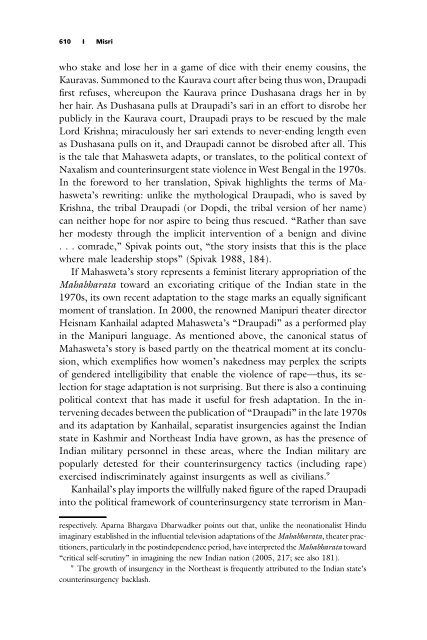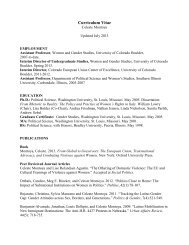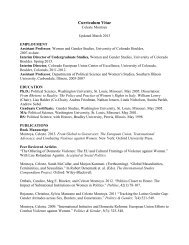Are you a man?: Performing Naked Protest in India - Women and ...
Are you a man?: Performing Naked Protest in India - Women and ...
Are you a man?: Performing Naked Protest in India - Women and ...
You also want an ePaper? Increase the reach of your titles
YUMPU automatically turns print PDFs into web optimized ePapers that Google loves.
610 ❙ Misri<br />
who stake <strong>and</strong> lose her <strong>in</strong> a game of dice with their enemy cous<strong>in</strong>s, the<br />
Kauravas. Summoned to the Kaurava court after be<strong>in</strong>g thus won, Draupadi<br />
first refuses, whereupon the Kaurava pr<strong>in</strong>ce Dushasana drags her <strong>in</strong> by<br />
her hair. As Dushasana pulls at Draupadi’s sari <strong>in</strong> an effort to disrobe her<br />
publicly <strong>in</strong> the Kaurava court, Draupadi prays to be rescued by the male<br />
Lord Krishna; miraculously her sari extends to never-end<strong>in</strong>g length even<br />
as Dushasana pulls on it, <strong>and</strong> Draupadi cannot be disrobed after all. This<br />
is the tale that Mahasweta adapts, or translates, to the political context of<br />
Naxalism <strong>and</strong> counter<strong>in</strong>surgent state violence <strong>in</strong> West Bengal <strong>in</strong> the 1970s.<br />
In the foreword to her translation, Spivak highlights the terms of Mahasweta’s<br />
rewrit<strong>in</strong>g: unlike the mythological Draupadi, who is saved by<br />
Krishna, the tribal Draupadi (or Dopdi, the tribal version of her name)<br />
can neither hope for nor aspire to be<strong>in</strong>g thus rescued. “Rather than save<br />
her modesty through the implicit <strong>in</strong>tervention of a benign <strong>and</strong> div<strong>in</strong>e<br />
. . . comrade,” Spivak po<strong>in</strong>ts out, “the story <strong>in</strong>sists that this is the place<br />
where male leadership stops” (Spivak 1988, 184).<br />
If Mahasweta’s story represents a fem<strong>in</strong>ist literary appropriation of the<br />
Mahabharata toward an excoriat<strong>in</strong>g critique of the <strong>India</strong>n state <strong>in</strong> the<br />
1970s, its own recent adaptation to the stage marks an equally significant<br />
moment of translation. In 2000, the renowned Manipuri theater director<br />
Heisnam Kanhailal adapted Mahasweta’s “Draupadi” as a performed play<br />
<strong>in</strong> the Manipuri language. As mentioned above, the canonical status of<br />
Mahasweta’s story is based partly on the theatrical moment at its conclusion,<br />
which exemplifies how women’s nakedness may perplex the scripts<br />
of gendered <strong>in</strong>telligibility that enable the violence of rape—thus, its selection<br />
for stage adaptation is not surpris<strong>in</strong>g. But there is also a cont<strong>in</strong>u<strong>in</strong>g<br />
political context that has made it useful for fresh adaptation. In the <strong>in</strong>terven<strong>in</strong>g<br />
decades between the publication of “Draupadi” <strong>in</strong> the late 1970s<br />
<strong>and</strong> its adaptation by Kanhailal, separatist <strong>in</strong>surgencies aga<strong>in</strong>st the <strong>India</strong>n<br />
state <strong>in</strong> Kashmir <strong>and</strong> Northeast <strong>India</strong> have grown, as has the presence of<br />
<strong>India</strong>n military personnel <strong>in</strong> these areas, where the <strong>India</strong>n military are<br />
popularly detested for their counter<strong>in</strong>surgency tactics (<strong>in</strong>clud<strong>in</strong>g rape)<br />
exercised <strong>in</strong>discrim<strong>in</strong>ately aga<strong>in</strong>st <strong>in</strong>surgents as well as civilians. 9<br />
Kanhailal’s play imports the willfully naked figure of the raped Draupadi<br />
<strong>in</strong>to the political framework of counter<strong>in</strong>surgency state terrorism <strong>in</strong> Manrespectively.<br />
Aparna Bhargava Dharwadker po<strong>in</strong>ts out that, unlike the neonationalist H<strong>in</strong>du<br />
imag<strong>in</strong>ary established <strong>in</strong> the <strong>in</strong>fluential television adaptations of the Mahabharata, theater practitioners,<br />
particularly <strong>in</strong> the post<strong>in</strong>dependence period, have <strong>in</strong>terpreted the Mahabharata toward<br />
“critical self-scrut<strong>in</strong>y” <strong>in</strong> imag<strong>in</strong><strong>in</strong>g the new <strong>India</strong>n nation (2005, 217; see also 181).<br />
9<br />
The growth of <strong>in</strong>surgency <strong>in</strong> the Northeast is frequently attributed to the <strong>India</strong>n state’s<br />
counter<strong>in</strong>surgency backlash.






